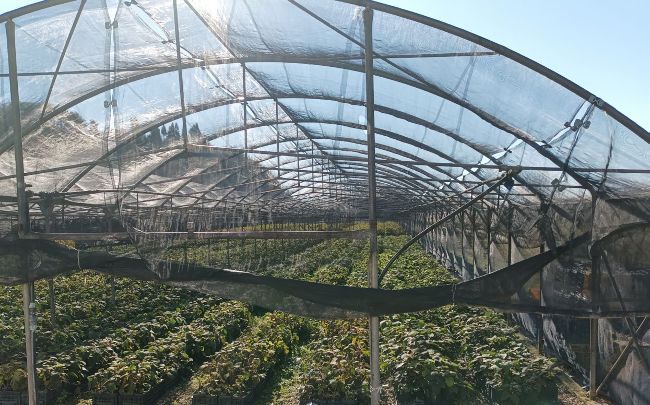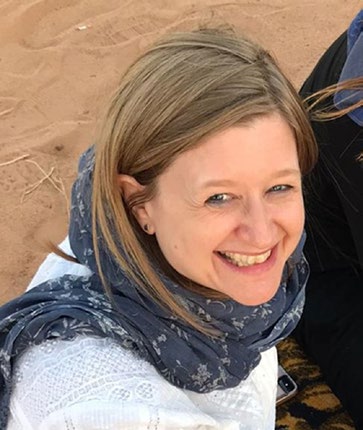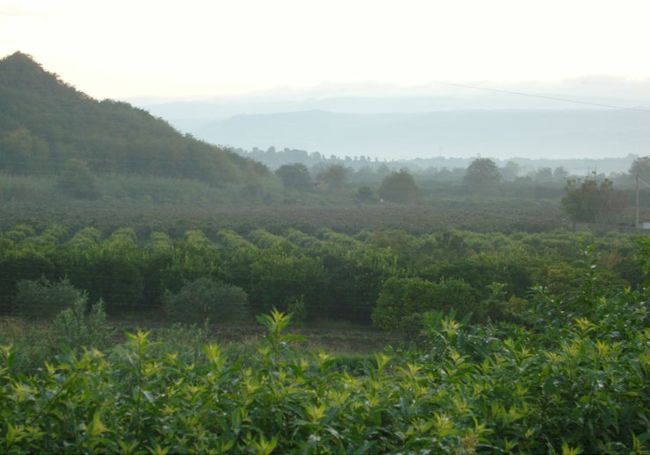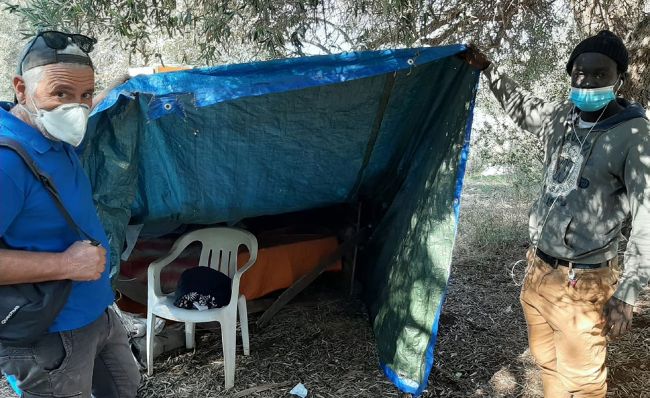COVER
Support and dignity
Jackie Macadam hears about the Italian refugee project behind last winter’s ‘Operation Orange’

Mani e Terra – greenhouse
CHURCH would seem to be an odd place to order fruit – but thanks to a tie- in with the Italian refugee and migrant programme, Mediterranean Hope, it’s hoped it’s something that will become more common as an innovative project takes root in Scotland.
“‘Operation Orange’ was coined as the name for the project to bring oranges from a co-operative in Calabria to Scotland,” says Carol Finlay, Congregational Engagement officer with the Church of Scotland’s Faith Action Team. “It started as a seemingly simple pilot project for congregations linked to Fiona Kendall (Church of Scotland mission partner with the Federation of Protestant Churches in Italy) but with the complexities of new import procedures following Brexit it proved more difficult than we imagined.
“Instead of receiving beautiful fresh oranges for Christingle services, it was not until Fairtrade Fortnight that they arrived – not the same oranges picked in December or we would all have been making marmalade – but sweet juicy fruits picked less than one week before being sent. One congregation said ‘it was like receiving a burst of Italian sunshine on a dreary Scottish February day’. In fact the delivery van arrived in Scotland on one of the only snowy days of the year!
“So, the oranges were picked, crated up and sent on three pallets to Cullen, Kilmarnock and Livingston where local co-ordinators ensured the crates were distributed to folk in the surrounding areas that had ordered them way back in
November. We were able to bring eating and juicing oranges, mandarins and lemons. Thankfully nearly all of those who ordered were happy to receive them whenever they arrived, saying ‘this is not about the orange itself but the learning that lies behind it’. That ‘learning’ is the point of the whole project.
“It was about learning about the plight of exploited workers, mainly migrants; it was about how the co-operative works with farmers to provide a market; it was about giving support and dignity to the workers themselves.”
Carol continues: “Once they reached congregations or homes, many went into churches where the story became part of Fairtrade Fortnight services before being taken home in the hands of congregation members to be consumed. Others went to Guilds, lunch clubs, schools and youth groups. One or two people who bought a crate donated them to a foodbank or other charity, including Positive Help who are supported through our HIV Programme, who put them into food parcels for clients.
“Others got creative. For example, Greenlaw Church in Duns Presbytery made marmalade, and Dunfermline Abbey Church made orange cakes and then sold the cake and the recipe; all reaping a return for the oranges and for Mediterranean Hope. Then there was the family who made beautiful juice to ward off the winter colds and of course there were folks who found they went well in a G&T too!”
Despite the various hurdles in getting the oranges here, Carol feels they have overcome the various pieces of red tape and are possibly looking at doing it again this winter. She says: “The project does need to have local co-ordinators but the amount of work each has is not enormous.
Each pallet has 56 crates which is not too onerous a number to distribute. If this is something you feel you could do locally – how great it would be to have pallets being delivered in every area of Scotland during the next orange season. I’d be delighted if people wanted to contact me.”
“The brand developed by Mediterranean Hope is called Etika,” explains Fiona. “Mani e Terra, the Calabrian co-operative with which we work, employs the workers harvesting the fruit, many of whom are documented migrants. 10% of the profit from produce sold through Mediterranean Hope is ploughed back into local Mediterranean Hope social projects.
“Calabria – aregion which is beautiful, fertile and blighted by organised crime – is often forgotten. Its farmers are under tremendous economic pressure. Etika helps local farmers to benefit from a ‘fair trade’ type basis – cutting out the many middle men and maximising the proceeds that go to the growers by expanding the market well beyond the usual buyers. Mani e Terra works with other local businesses and cooperatives of ethical and organic producers to promote a fair trade supply chain that is committed to fair wages, upholding workers rights and improving working conditions, especially those of the seasonal workers who work in the fruit fields locally.
The initiative therefore benefits producers and workers alike – not to mention buyers, who can enjoy delicious produce safe in the knowledge that no one has been exploited at any point in the process. Operation Orange has enabled folk in Scotland to contribute directly to this small but important initiative.”
The decision to invite Scottish churches to participate followed successful pilots in Italy and in Germany, now in their third year. “We have been bowled over by the level of engagement,” say Fiona’s colleagues in Calabria. “Financial support is important to all our projects but this direct connection with church members tells us how much it matters to people to be able to do something positive. We know that the initiative is also pushing buyers to ask questions about exploitation which may be happening on their own doorstep.
If this helps to bring exploitation to an end in other places too, so much the better.”
The work in Calabria is just one element of Mediterranean Hope’s wide-ranging programme. Much better known for its work in bringing refugees safely to Europe, Mediterranean Hope is the umbrella name for a variety of projects led by the Federation of Protestant Churches in Italy (FCEI). FCEI has teams based in Sicily, Lampedusa, Calabria, Rome, Beirut and Bosnia, all working together to try to help people on the move. “FCEI does not target or exclude particular ethnic groups. People try to reach Europe from many different countries and continents, and for many different reasons,” Fiona says.

Fiona Kendall

Citrus groves
“Living conditions for people on the move can be horrible,” she adds. “If we think about the situation of exploited workers in Calabria, it would be fair to describe these as hellish. People share cramped accommodation in tent cities and container camps, often without access to electricity or to running water. One key aspect of Mediterranean Hope’s work is therefore to restore dignity.
“It has been a long-term dream to provide people with dignified accommodation – aplace where those on the margins can be housed, contribute and begin to restore their self-respect.
“That dream encouraged us to begin another project in Calabria which provides a social housing unit for some of the migrant workers, albeit a small number initially. The residents have called their new home Dambe So – which means House of Dignity in Bambara, a language widely spoken in West Africa.
“We are renting a disused apartment building with seven flats. We’ve done them up and outfitted them with new but simple furniture. We can house 21 carefully selected people at a time. Each flat typically contains one vulnerable person with two less so, the idea being that they support each other. All are employed and contribute to rent, because being able to feel you are paying your way and not living on charity is an important step towards regaining self-esteem. The rent is, however, set at a realistic level. Residents can cycle from Dambe So to the fields where they work so, again, they can be comparatively self-sufficient. When it’s not harvest time in Calabria, and workers transfer to other regions to pick up other seasonal work, the hostel is open to others. Recently, faith-based volunteers have taken rooms there, enabling them to gain a closer understanding of the local situation and to contribute directly to local projects.
“Initially, locals were a bit concerned about migrant workers living beside them but Dambe So residents – and volunteers – have taken it upon themselves to do a big clean-up of the local beach, which had been neglected. They’ve picked up litter and cleaned it, and now it’s an amenity for everyone to use!
“There are also tentative plans to use the ground floor of the building to create a social space for the community – maybe a café or other social gathering spot.
The area doesn’t have many amenities so, again, we want to enable to local people to be able to use it as well.
“We’ve learned through the years that to only help newcomers is a great way to alienate locals! Where possible, all our projects are designed to help the local community too – we build it in to new projects in advance.
“Mediterranean Hope takes a holistic view of the migrant situation. FCEI’s Migrant and Refugee Programme was established after the October 2013 tragedy when 368 people died in a shipwreck off Lampedusa. A tiny team was sent to support those arriving in their thousands on the island and to support to the local community. FCEI now has a permanent Migration Observatory on the island analysing and communicating how migration is unfolding from one of the EU’s southernmost borders.
“In 2021, nearly 33,000 people reached Lampedusa, mostly from Tunisian and Libyan ports. It’s estimated that, in the same year, more than 2,000 died attempting to cross. There are countless stories of horrors on the long journey – torture, kidnapping, rape, forced labour, gratuitous violence, robbery and killing.
“People share cramped accommodation in tent cities and container camps, often without access to electricity or to running water. One key aspect of Mediterranean Hope’s work is therefore to restore dignity.
“Some are trying escape the deteriorating economic and political situations at home. One traveller told Mediterranean Hope workers that, after the covid epidemic shut hotels in Tunisia, he couldn’t afford to feed his family. Even a loaf of bread was outside his means. It persuaded him to take his family and try their chances on the brutal journey to Europe and perhaps a better life.”
Another Mediterranean Hope team focuses on supporting refugees at their reception centre on Sicily. The ‘Casa Delle Culture’ (House of Many Cultures) is designated a ‘safe space’ for migrants who have suffered particular trauma on their journey. It houses up to 40 at a time: unaccompanied minors, single women, women with small children or vulnerable families. They receive specialised help in navigating bureaucracy, the asylum procedure and finding work but, first and foremost, they are taught Italian. That is the first step towards integration.

Somewhere to sleep
“Many of those who stay at the Casa delle Culture have arrived via our ‘humanitarian corridors’ programme, a model now been replicated in many European countries,” says Fiona. “Since 2016 this pioneering initiative has helped bring refugees safely and, importantly, legally into Europe. It’s not just about safe passage. We work with those who come for up to two years to give them the best chance of integrating with local communities – an ethos demonstrated in the flats we mentioned earlier.
“We really do try to tailor the help we offer to what is needed, and to keep the gospel at the forefront, always testing whether it is appropriate to pursue particular projects.”
Fiona began her professional life as a solicitor in Scotland, specialising in family law and mediation, but she was also a lay preacher.
“After 20 years in law, I realised that I was feeling a very strong call, and approached the then World Mission Council to see if they could make use of me.
“They asked if I spoke Italian – and, although rusty, I did. That’s when I found out about the Mediterranean Hope project and how I could potentially contribute. My work as its European and Legal Affairs Advisor enables me to utilise skills built up in my legal life over many years – finding constructive ways to figure out difficult problems, mediating, analysing and presenting.
“It’s principally an advocacy role. I represent the organisation and lobby for constructive approaches to migration in Italy, elsewhere in Europe and beyond. I also keep our donors abreast of the work we are doing – and work to engage them directly where possible, as was the case with Operation Orange.
It’s a real privilege to work with such a creative and committed group of people and to be part of such a diverse programme of work. The fact that people of faith in different parts of the world can be connected through their common commitment to those on the margins is tremendous.”
Find out more about Mediterranean Hope at www.mediterraneanhope.com/en_en/ You can contact Carol Finlay on cfinlay@ churchofscotland.org.uk